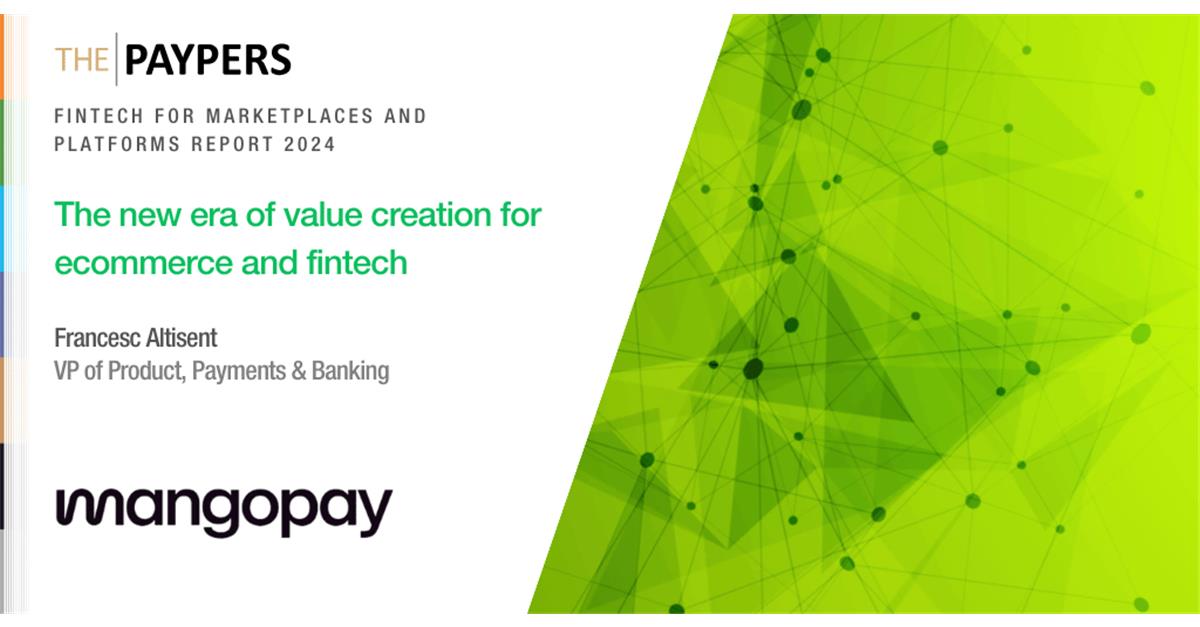Fintech
The New Era of Value Creation for E-Commerce and FinTech

Francesco AltisentVice President of Product, Payments and Banking at MangoPayaddresses the topic of embedded finance, digital wallets, orchestration and interconnectivity.
The continued growth of e-commerce underscores its apparent resilience against economic headwinds and geopolitical instability. This growth presents countless opportunities for fintech and e-commerce companies as they create more integrated payment experiences for end users.
E-commerce platforms leverage partnerships with fintechs to offer integrated financial solutions to end users, such as BNPL (Buy Now, Pay Later), one-click payments, co-branded credit cards, embedded wallets, and more. Through these partnerships, fintechs can tap into a large user base, and e-commerce platforms offer a streamlined payment experience to their customers, while unlocking new revenue streams from additional monetization and revenue sharing opportunities. For end users, this means a more convenient and unified shopping experience. Fintechs can reduce their cost per acquisition (CPA), and e-commerce increases its revenue, while end users enjoy a safer and smoother experience. All of this paves the way for more sustainable growth.
The Rapid Rise of Embedded Finance
The market value of Embedded Finance is expected to grow to $7.2 trillion by 2030with insurance, finance and payments leading the way. B2B BNPL and trade finance solutions are driving this growth, giving merchants faster access to working capital and accelerating adoption by businesses and consumers.
Meanwhile, FinTech-enabled marketplaces and platforms are commanding higher valuations than their peers, demonstrating the power of Embedded Finance to enhance customer experience and drive business growth. Through 2024, we expect to see a continued convergence of financial services and non-financial experiences. This trend will translate into a significant share of FinTech revenues being generated via embedded channels, further cementing the transformative impact of this emerging technology.
The Power of the Wallet
Wallet infrastructure enables companies to create digital wallets for their customers, allowing them to store, send, and receive funds effortlessly. The same infrastructure also provides a solid foundation for marketplaces and platforms to capture additional revenue streams through wallet-facilitated transactions within their apps and websites. Payment flows that operate outside of a wallet infrastructure could limit customization and hamper revenue potential. Additionally, e-wallets’ ability to hold funds through their Electronic Money Institution (EMI) license provides platforms with greater flexibility to hold funds within their ecosystem when needed.
On the operational front, a wallet infrastructure streamlines the movement of money across the platform, allowing marketplaces to create multiple wallet accounts for each type of transaction, including fees, platform fees, seller wallets, and even buyer wallets.
This segmentation improves financial transparency, giving both sellers and buyers greater control over their funds. Additionally, the same wallet infrastructure can be the basis for creating an integrated seller earnings management experience directly within the platform. This allows sellers to track their earnings, manage payments, and access comprehensive financial information, streamlining their operations and promoting customer satisfaction.
Orchestration is the key to unification
While it provides a number of benefits, a wallet infrastructure alone is not sufficient to create a scalable payment flow. A payment orchestration layer brings together multiple payment systems into a single, interoperable ecosystem, providing greater control and flexibility in scaling payment operations. In a vendor-locked payment setup, payment data is often captured and secured in a non-interoperable token vault within a payment provider.
With the payment technology network in an Embedded Finance setup, building automation without an interoperable token vault can be challenging. Additionally, managing refunds and chargebacks from multiple payment providers and payment methods may require platforms to build their own unified PaymentOps ledger, or juggle multiple dashboards from different payment providers. Both approaches are time-consuming and resource-intensive.
A payments orchestration layer not only unifies all of your operations, but also provides a network of third-party providers, such as payment gateways, fraud prevention solutions, CMS, and more, enabling faster integrations.
The shift towards interconnectivity
With unified experiences becoming the new standard, we will see a shift in the e-commerce payment system towards a more interconnected and buyer-agnostic ecosystem.
By leveraging both a wallet-based payment infrastructure and payment orchestration, a modern marketplace can achieve agile and scalable operations by unifying its operations into a single ecosystem and unlocking efficiency and revenue growth. This allows the entire infrastructure to be future-proofed as digital commerce continues to evolve.
This op-ed piece was first published in The Paypers’ Fintech Marketplace and Platform Report 2024 that taps into the rapidly growing e-commerce industry, serving as the definitive source of information for businesses looking to expand and grow their consumer base.
About Francesc Altisent
 Francesc Altisent is VP of Product, Payments & Banking at Mangopay. Based in Monaco, Francesc joined Mangopay in 2023, having previously worked at Airwallex, Amazon and Adyen.
Francesc Altisent is VP of Product, Payments & Banking at Mangopay. Based in Monaco, Francesc joined Mangopay in 2023, having previously worked at Airwallex, Amazon and Adyen.
About Mangopay
 Created in 2013, MangoPay enhances the platform economy with its modular payment infrastructure. Built around its programmable e-wallet solution, Mangopay’s end-to-end infrastructure covers the platform’s payment needs, from inbound and outbound payment to full fraud and FX prevention, for many business models and workflows. The company has 235 million end users of its services and has processed over €100 billion in transactions since its inception.
Created in 2013, MangoPay enhances the platform economy with its modular payment infrastructure. Built around its programmable e-wallet solution, Mangopay’s end-to-end infrastructure covers the platform’s payment needs, from inbound and outbound payment to full fraud and FX prevention, for many business models and workflows. The company has 235 million end users of its services and has processed over €100 billion in transactions since its inception.
Fintech
Lloyds and Nationwide invest in Scottish fintech AI Aveni

Lloyds Banking Group and Nationwide have joined an £11m Series A funding round in Scottish artificial intelligence fintech Aveni.
The investment is led by Puma Private Equity with additional participation from Par Equity.
Aveni creates AI products specifically designed to streamline workflows in the financial services industry by analyzing documents and meetings across a range of operational functions, with a focus on financial advisory services and consumer compliance.
The cash injection will help fund the development of a new product, FinLLM, a large-scale language model created specifically for the financial sector in partnership with Lloyds and Nationwide.
Joseph Twigg, CEO of Aveni, explains: “The financial services industry doesn’t need AI models that can quote Shakespeare, it needs AI models that offer transparency, trust and, most importantly, fairness. The way to achieve this is to develop small, highly tuned language models, trained on financial services data, vetted by financial services experts for specific financial services use cases.
“FinLLM’s goal is to set a new standard for the controlled, responsible and ethical adoption of generative AI, outperforming all other generic models in our selected financial services use cases.”
Robin Scher, head of fintech investment at Lloyds Banking Group, says the development programme offers a “massive opportunity” for the financial services industry by streamlining operations and improving customer experience.
“We look forward to supporting Aveni’s growth as we invest in their vision of developing FinLLM together with partners. Our collaboration aims to establish Aveni as a forerunner in AI adoption in the industry, while maintaining a focus on responsible use and customer centricity,” he said.
Fintech
Fairexpay: Risk consultancy White Matter Advisory acquires 90% stake in fintech Fairexpay

Treasury Risk Consulting Firm White Matter Alert On Monday he announced the acquisition of a 90% stake in the fintech startup Fair payment for an undisclosed amount. The acquisition will help White Matter Advisory expand its portfolio in the area of cross-border remittance and fundraising services, a statement said. White Matter Advisory, which operates under the name SaveDesk (White Matter Advisory India Pvt Ltd), is engaged in the treasury risk advisory business. It oversees funds under management (FUM) totaling $8 billion, offering advisory services to a wide range of clients.
Improve your technology skills with high-value skills courses
| IIT Delhi | Data Science and Machine Learning Certificate Program | Visit |
| Indian School of Economics | ISB Product Management | Visit |
| MIT xPRO | MIT Technology Leadership and Innovation | Visit |
White Matter Advisory, based in Bangalore, helps companies navigate the complexities of treasury and risk management.
Fairexpay, authorised by the Reserve Bank of India (RBI) under Cohort 2 of the Liberalised Remittance Scheme (LRS) Regulatory Sandbox, boasts features such as best-in-class exchange rates, 24-hour processing times and full security compliance.
“With this acquisition, White Matter Advisory will leverage Fairexpay’s advanced technology platform and regulatory approvals to enhance its services to its clients,” the release reads.
The integration of Fairexpay’s capabilities should provide White Matter Advisory with a competitive advantage in the cross-border remittance and fundraising market, he added.
The release also states that by integrating Fairexpay’s advanced technology, White Matter Advisory aims to offer seamless and convenient cross-border payment solutions, providing customers with secure options for international money transfers.
Fintech
Rakuten Delays FinTech Business Reorganization to 2025

Rakuten (Japan:4755) has released an update.
Rakuten Group, Inc. and Rakuten Bank, Ltd. announced a delay in the reorganization of Rakuten’s FinTech Business, moving the target date from October 2024 to January 2025. The delay is to allow for a more comprehensive review, taking into account regulatory, shareholder interests and the group’s optimal structure for growth. There are no anticipated changes to Rakuten Bank’s reorganization objectives, structure or listing status outside of the revised timeline.
For more insights on JP:4755 stock, check out TipRanks Stock Analysis Page.
Fintech
White Matter Advisory Acquires 90% Stake in Fintech Startup Fairexpay

You are reading Entrepreneur India, an international franchise of Entrepreneur Media.
White Matter Advisory, which operates under the name SaveDesk in India, has announced that it is acquiring a 90% stake in fintech startup Fairexpay for an undisclosed amount.
This strategic move aims to strengthen White Matter Advisory’s portfolio in cross-border remittance and fundraising services.
By integrating Fairexpay’s advanced technology, White Matter Advisory aims to offer seamless and convenient cross-border payment solutions, providing customers with secure options for international money transfers.
White Matter Advisory, known for its treasury risk advisory services, manages funds under management (FUM) totaling USD 8 billion.
Founded by Bhaskar Saravana, Saurabh Jain, Kranthi Reddy and Piuesh Daga, White Matter Advisory helps companies effectively manage the complexities of treasury and risk management.
The SaveDesk platform offering includes a SaaS-based FX market data platform with real-time feeds for over 100 currencies, bank cost optimization services, customized treasury risk management solutions, and compliance guidance for the Foreign Exchange Management Act (FEMA) and other trade regulations.
Fairexpay is a global aggregation platform offering competitive currency exchange rates from numerous exchange partners worldwide. Catering to both private and corporate customers, Fairexpay provides seamless money transfer solutions for education, travel and immigration, as well as simplifying cross-border payments via API and white-label solutions for businesses. Key features include competitive currency exchange rates, 24-hour processing times, extensive currency coverage of over 30 currencies in more than 200 countries, and secure, RBI-compliant transactions.
-

 DeFi12 months ago
DeFi12 months agoSwitchboard Revolutionizes DeFi with New Oracle Aggregator
-

 News1 year ago
News1 year agoLatest Business News Live Updates Today, July 11, 2024
-

 DeFi12 months ago
DeFi12 months agoIs Zypto Wallet a Reliable Choice for DeFi Users?
-

 DeFi1 year ago
DeFi1 year ago👀 Lido prepares its response to the recovery boom
-

 Fintech12 months ago
Fintech12 months agoFinTech LIVE New York: Mastercard and the Power of Partnership
-

 DeFi12 months ago
DeFi12 months agoEthena downplays danger of letting traders use USDe to back risky bets – DL News
-

 Fintech1 year ago
Fintech1 year ago121 Top Fintech Companies & Startups To Know In 2024
-

 ETFs1 year ago
ETFs1 year agoGold ETFs see first outing after March 2023 at ₹396 cr on profit booking
-

 Fintech1 year ago
Fintech1 year agoFintech unicorn Zeta launches credit as a UPI-linked service for banks
-

 News1 year ago
News1 year agoSalesforce Q1 2025 Earnings Report (CRM)
-

 DeFi1 year ago
DeFi1 year agoTON Network Surpasses $200M TVL, Boosted by Open League and DeFi Growth ⋆ ZyCrypto
-

 ETFs1 year ago
ETFs1 year agoLargest US Bank Invests in Spot BTC ETFs While Dimon Remains a Bitcoin Hater ⋆ ZyCrypto

















